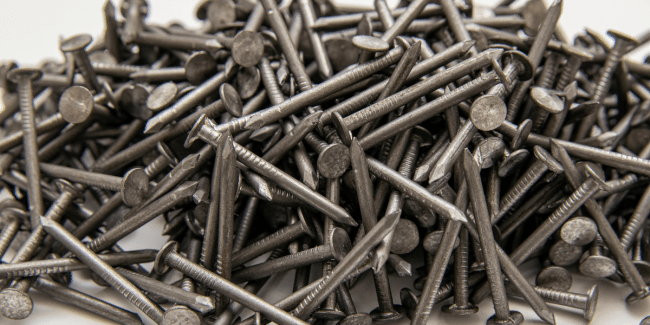
The Ultimate Nail Guide: Different Types, Uses, Sizes
Are you working on a construction project and need to know what nails to use? This quick guide from the experts at Crane Point Industrial will provide a comprehensive list of the different types of nails for construction, including the most common sizes and applications.
A Comprehensive List of Construction Nails: Common Types and Sizes
Whether you are building a deck, cabinet, roof, or any other project, this blog post will help you find the right type of nail for the job.
Framing Nails
Framing nails are one of the most common types of construction nails used in wood frame construction. These nails are specifically designed for fastening lumber together, including wall framing, roof framing, and floor framing.
These nails have a large head and a pointed tip, allowing them to penetrate wood easily and hold securely. Whether you are a professional contractor or a DIY enthusiast, framing nails are essential to any building project involving wood framing.
Box Nails
Another common type of construction nail is the box nail. They are used in many different types of construction, from framing to finishing. The box nails are called so because they come in a box, not a coil. They are used in heavy-duty work, like building frames, framing walls, and installing joists.
One thing to remember when using box nails is that they have a flat head. It means they may not have the same holding power as other nails with different head shapes. However, they still provide a good grip and are a great option for framing.
Sinker Nails
Sinker nails are designed for framing and construction work. They are specially designed with a flattened head that can be easily driven into the surface without splitting the wood or damaging it. These nails are most commonly used in building houses and commercial buildings.
The main feature distinguishing a sinker nail from other construction fasteners is its flattened head, which can be driven down into the wood. This feature helps prevent the nail from rising over time, which can happen with other types of nails.
Deck Nails
Deck nails are designed for outdoor construction and can withstand exposure to the elements. They are made from stainless steel or galvanized steel, which makes them resistant to rust and corrosion.
Deck nails come in various sizes and styles, including spiral, ring, and smooth shank. Ring shank deck nails are especially popular because they provide excellent holding power and prevent the deck boards from pulling up over time. So if you’re planning to build a deck, make sure you use the right type of nails to ensure your project stands up to the elements.
Roofing Nails
Roofing nails are designed to secure shingles, felt paper, and roofing tiles to the roof deck. These nails are often coated with galvanized or stainless steel to prevent rust and corrosion. They also feature a larger head to provide more secure attachment and to prevent the roofing material from pulling through.
Roofing nails come in various lengths and sizes, depending on the type and thickness of the roofing material. They are often sold in large quantities, as roofing projects typically require a significant amount of nails. Choosing the right type and size of roofing nail is crucial to ensure the stability and durability of the roof.

Masonry Nails
Masonry nails are designed for brick, concrete, and other materials. These nails are made with hard and durable steel that allows them to be driven through tough materials without bending or breaking. In addition, masonry nails often have fluted shafts that provide extra grip and reduce the risk of the nail slipping out of the material.
Additionally, they may feature flat, chiseled, or diamond-shaped tips to help them penetrate through masonry. Due to their specific design and function, masonry nails are crucial in construction projects that require anchoring or fastening masonry materials.
Siding Nails
Siding nails are designed specifically for attaching siding materials to the exterior of a building. These nails are typically made of stainless steel or hot-dipped galvanized steel, which prevents them from corroding and damaging the siding over time. Siding nails are also coated with a special adhesive that helps to create a strong bond between the nail and the siding material, ensuring that the siding remains firmly in place even during extreme weather conditions.
The head of a siding nail is typically flat or slightly domed, which allows it to be easily countersunk into the siding material without leaving a visible hole or mark on the surface.
Brad Nails
Brad nails are a type of finishing nail that is smaller and thinner in diameter than traditional nails. They are used for delicate projects where a large and unsightly nail head would be detrimental to the overall appearance. Brad nails are often used for finishing and trimming work, such as attaching moldings or small decorative pieces. They are also commonly used in furniture-making and other crafts.
Due to their smaller size, they can be easily concealed with putty or wood filler, making them a popular choice for DIY enthusiasts and professional woodworkers. In addition, brad nails come in various lengths and gauges, allowing for greater versatility in project applications.
Drywall Nails
As the name suggests, drywall nails are designed to hang drywall sheets. These types of fasteners have a thinner shank and a large, flat head that helps hold the drywall securely in place without damaging the surface.
It’s important to use the right size of drywall nail for the job to ensure proper attachment and avoid damaging the drywall. Using the wrong size or type of nail can result in popped or cracked drywall, which can be costly. If you plan to work with drywall, stock up on the appropriate nails to ensure a smooth and successful project.
Flooring Nails
Flooring nails are specifically designed to securely fasten floorboards to the subfloor. These nails have a smaller head than other construction nails to avoid splitting the wood. They are typically made from hardened steel and come in various lengths and gauges. Choosing the right size of flooring nail is important to ensure the boards are properly fastened without causing any damage.
Flooring nails can also come with serrated edges or fluted shanks to provide a better grip and prevent the nails from backing out over time. Whether you are installing hardwood, laminate, or engineered flooring, using the appropriate nail is essential for a long-lasting and durable floor.

Duplex Nails
Duplex nails are double-headed nails designed for temporary use in construction projects. They are often used in framing, especially when the frame needs to be disassembled later. The double-headed design of the duplex nail allows for easy removal by pulling on the exposed head with a claw hammer.
They are available in various sizes to suit different needs, making them a versatile option for any project. However, it’s worth noting that they are not intended for long-term structural use and should only be used temporarily.
Common Nail Sizes
Nail sizes are measured in penny (d) increments, and the most common nail sizes for construction include 16d, 12d, 10d, and 8d. 16d nails are typically used for framing applications, while 12d and 10d nails are used for general construction and framing. 8d nails are smaller and are often used for finishing work like trim or baseboards.
The diameter of a nail is also an important factor to consider. Typically, a thicker nail will have more holding power but also require drilling a larger hole. Common nail diameters range from 0.134 inches for 8d nails to 0.238 inches for 60d nails.
It’s important to note that the nail size and diameter needed for your specific project will vary depending on the type of wood and the intended use of the nail. Therefore, it’s always best to consult a professional or refer to the manufacturer’s guidelines before selecting a nail size.
Crane Point Industrial Has the Types of Nails You Need
At Crane Point Industrial, we offer a variety of nail sizes and diameters to fit your construction needs. Contact us to learn more about our selection and find the right nail for your project.